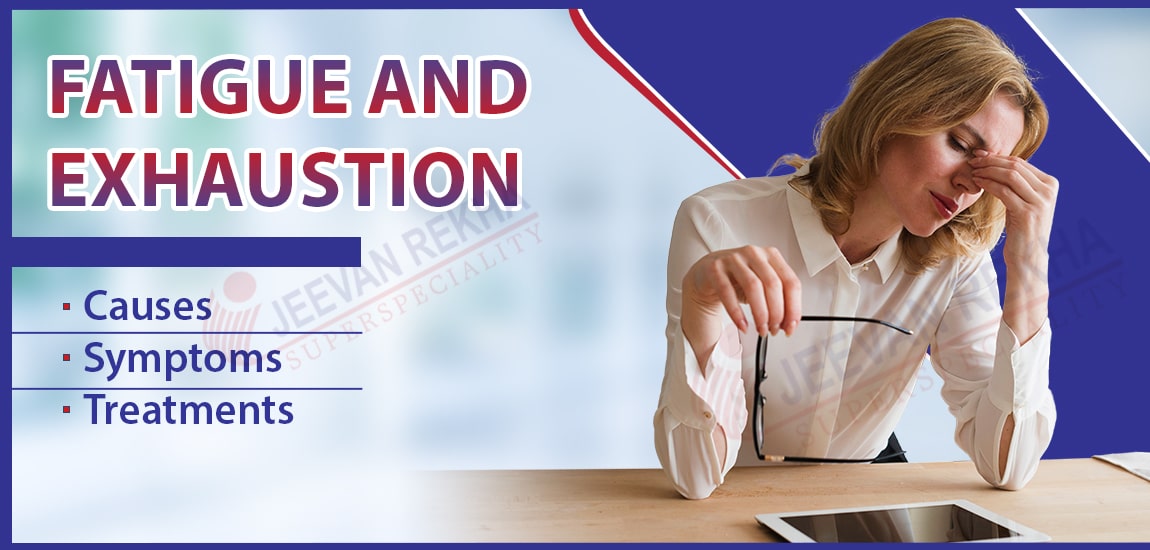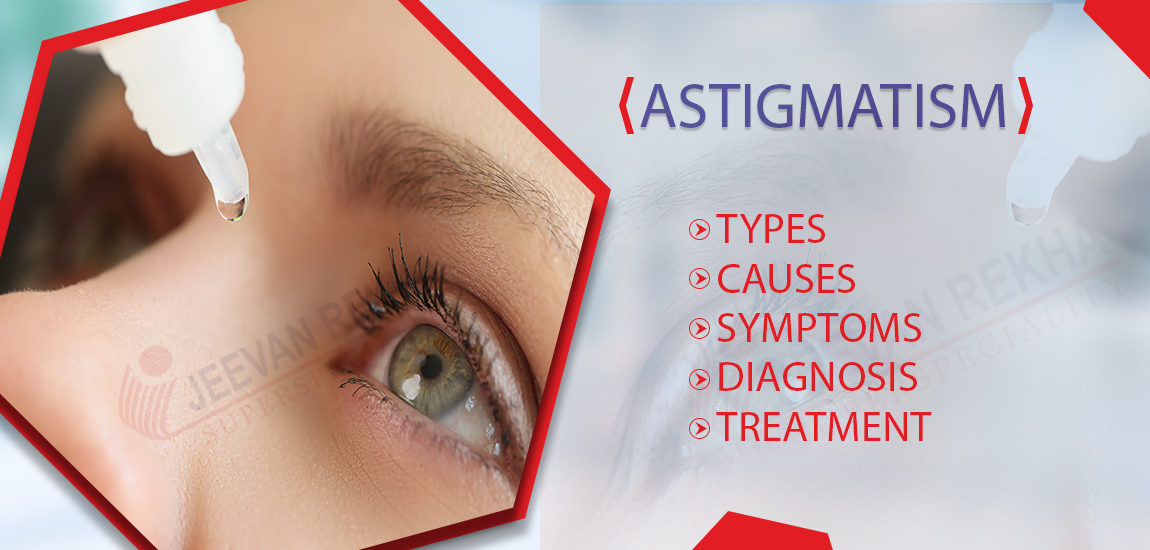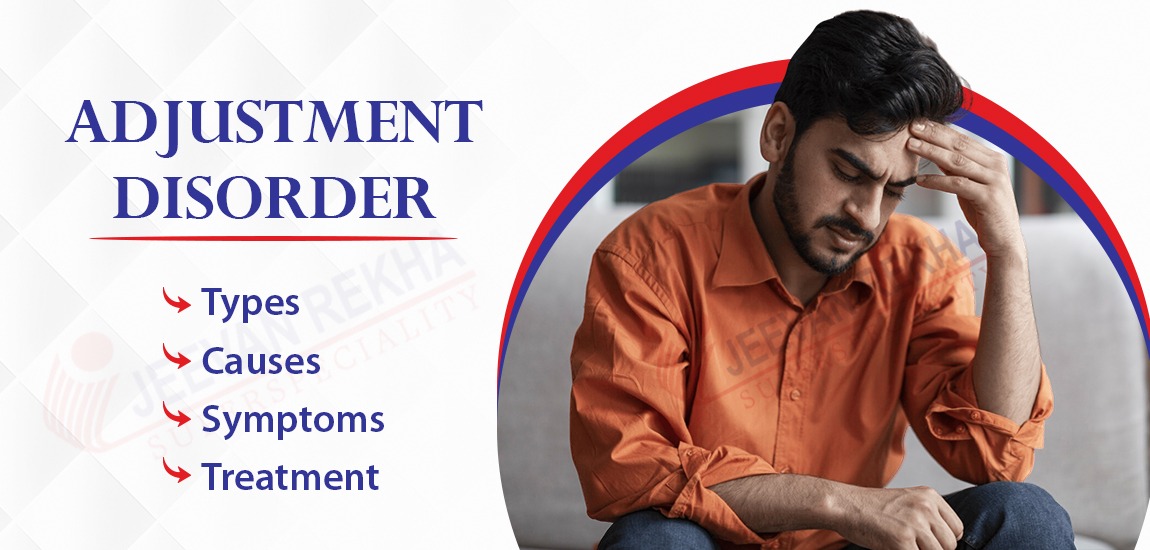
- By Jrsh Admin
- In Health and Tips,
- Posted January 08, 2025
Fatigue and Exhaustion: Causes, Symptoms, and Treatment
What Are Fatigue and Exhaustion?
Generally, terms fatigue and exhaustion may refer to a condition, both mental and physical, of extreme tiredness or of being depleted of energy after prolonged engagement in some activity or stretch of activity.
Fatigue typically refers to a general feeling of tiredness or a reduction in one's ability to perform some work, which can be ascribed to any number of factors, like inadequate sleep, overexertion, illness, or emotional stress. It can be remedied through rest, drinking fluids, and the right diet.
Exhaustion, on the contrary, depicts a much deeper and greater degree of fatigue that is normally associated with all-consuming feelings of depletion—physically and mentally. It usually results from prolonged or too-stretching stress with inadequate recovery or very serious health issues. It often requires longer and more intense rest periods and medical attention for recovery. Such situations keep people from functioning normally daily.
Common Causes of Fatigue and Exhaustion
There are numerous contributing factors for fatigue and tiredness. Generally, these will contain physical and psychological prospects. Such factors mostly include:
- Sleep Deprivation: Impair chronic sleep function, probably among the most frequently cited factors for fatigue; thus, full recharge reestablishes the body and mind.
- Physical Over-exertion: Any activity of the body without sufficient rest can be the cause of fatigue of the muscles and general tiredness.
- Poor Nutrition: An imbalanced diet may deprive the body of the vital nutrients it requires and the energy for a lack of consumption and dehydration.
- Stress and Anxiety: An ongoing mental and emotional strain saps one's energy eventually and prompts one to become tired. Anxiety and worry can disrupt sleep due to incessant thoughts serving to exercise the brain, thus leading to fatigue.
- Medical Conditions: Several diseases, such as anemia, diabetes, thyroid disorders, chronic fatigue syndrome, and sleep apnea, may lead to exhaustion and fatigue. Some medications may also include side effects visible in the form of tiredness.
- Mental Health Issues: Depression, for example, is closely coupled with mental and physical exhaustion as it directly influences energy levels and motivation.
You can read also:- Comprehensive Guide to Ear, Nose, and Throat (ENT) Infections
Types of Fatigue
The manifestation of fatigue is various, each type caused by different reasons and affecting individuals differently. The main types of fatigue include:
- Physical Fatigue: This type is caused by depletion of body's muscles and energy after a physical activity. It is mostly experienced after exercise, physical labor or standing or walking for too long. One is to be relieved from such physical fatigue by perfect dangling rest, appropriate hydration and nutrition.
- Mental fatigue: Also known as cognitive fatigue, this would greatly affect the ability of a brain to concentrate, process information, and make decisions. Causes would be long hours of rigid mental work, stress, or lack of sleep. Symptoms would also include focusing and forgetting things, as well as confusion within the head.
- Emotional Fatigue: This fatigue is brought about by chronic emotional strain, like with the experience of grief, anxiousness, or relationship problems. Emotional fatigue leads to feeling overwhelmed, irritable, and reduced ability to confront everyday issues.
- Chronic Fatigue: Fatigue can extend for a longer time, that is usually for six months or much longer, and become chronic. An example of conditions with which chronic fatigue is affiliated includes chronic fatigue syndrome (CFS), fibromyalgia, or some medical conditions. Chronic fatigue can be described as persistent tiredness, which does not quite tend to improve with resting, and it often interferes with activities of daily living.
- Sleep-related Fatigue: It involves sleep deprivation or sleep of poor quality. Sleep-related fatigue is usually due to sleep disorders, e.g., insomnia, obstructive sleep apnea, or other forms of sleep pattern disruption. This results in daytime drowsiness, irritability, and a feeling of not being energetic enough.
- Temporary fatigue: This is a form of fatigue that happens based on a particular given situation, for instance, stress from a big project, major life changes, and recovery from an illness or surgery, and it usually goes away when the situation or the healing of the body happens.
- Compensatory Fatigue: This happens when the body or mind tries to overcompensate for the lack of rest or recovery by pushing through exhaustion. This could even worsen the condition, whereby the body would not have enough time to recover.
Symptoms of Fatigue and Exhaustion
Symptoms of fatigue and exhaustion include:
- Physical fatigue concerns muscle weakness, tiredness, loss of stamina, and even doing physical tasks.
- Mental fatigue involves concentrational problems and brain fog, forgetfulness, and impaired decision-making.
- Emotional fatigue features irritability, mood swings, emotional overwhelm, and even burnout.
- Sleep inertia includes daytime drowsiness or difficulty to remain awake because one has taken adequate sleep but still lacks energy.
- Exhausted people feel constantly tired and lack motivation, feeling drained both physically as well as mentally - making it difficult to bounce back even after rest.
You can read also:- Why Do I Have Cramps But No Period?: Causes, Symptoms, and Treatments
Treatment Options for Fatigue and Exhaustion
Treatment options for fatigue and exhaustion depend on the underlying causes but generally include the following approaches:
- Rest and sleep: Prioritizing sleep quality and adequate rest is one of the best ways to combat fatigue. According to . Adults generally require 7-9 hours of sleep per night, while remedial measures to mend sleep disorders (known as insomnia or sleep apnea) may lend a hand in the enhancement of energy levels.
- Balanced Diet: A healthy diet that consists of many fruits and vegetables, whole grains, lean protein, and healthy fats should increase energy levels. It is equally important to drink adequate water to prevent fatigue.
- Exercise: Regular mild exercise may boost energy levels, relieving stress and enhancing general well-being. Even light activities like walking or yoga can be beneficial.
- Stress Management: Practicing relaxing techniques like some progressive muscle relaxation, deep breathing, meditation, and mindfulness would help gather mental and emotional stress, relieving fatigue.
- Address underlying diseases that need consumption; the depletion of such energy, as a function, is attributable to most of the medical conditions, such as anemia, thyroid disorders, and sleep apnea. Diagnosing that condition and applying the right treatment where wellbeing is concerned should be done by the healthcare provider.
- Limiting Consumption of Stimulants: It will keep reducing caffeine and alcohol and will give relief from problems related to sleep and energy crashes, which may help in overall alleviation of fatigue.
- Time Managements and Breaks: Burnout and cognitive tiredness can be kept at bay by managing workloads, taking frequent breaks during the day, and goal-setting realistically.
- Therapy or Counseling: Emotional or mental fatigue as a result of anxiety, depression, or other mental issues can be counseled and treated effectively through therapy.
- Medications: Some conditions that lead to fatigue are treated with medications whereby a doctor can prescribe antidepressants, pain relief medications, or sleep disorder-specific treatments.
When to Seek Medical Attention for Fatigue
Seek medical attention for fatigue when:
- Fatigue has lasted for weeks despite getting enough rest and attending to oneself.
- Fatigue has not been sudden but rather very unbearable, thus affecting the completion of daily duties.
- There have been other distinct symptoms that accompany fatigue such as loss of weight without apparent cause, unexplained chest pain, difficulty in breathing, or dizzy spells with headaches that tend to recurrently pierce through any pain exhibited in the joints.
- To sleep well would be the ideal situation; however, a feeling of fatigue cannot lead one to fulfill the above-mentioned condition, and sleep soon followed by continuous sleepless nights is not improving at all.
- Mood Changes: He experiences a more-than-ordinary shift in one or another mood like feeling depressed, too anxious, or irritable, which may speak of an underlying mental pathology.
- Known Diseases: During progress in fatigue in chronic conditions such as diabetes, during heart diseases, and during any thyroid problems, proper management became very important.
- Side Effects of Medicines: Suspecting that medicine might be the cause of fatigue from which there is relief, the physician is required to elaborate on other treatment options.
Tags
Blog Search
Latest Posts
-
5 Tips for a Happy and Healthy Summer
February 27, 2025 -
Body Ache (Pain): Causes, Symptoms and Treatment Options
February 10, 2025 -
Fatigue and Exhaustion: Causes, Symptoms, and Treatment
January 08, 2025 -
Testicular Health: Essential Facts and Care Tips for Men
December 27, 2024 -
Neuroendocrine Tumors: Types, Symptoms, Risk Factors & Treatment
December 26, 2024




